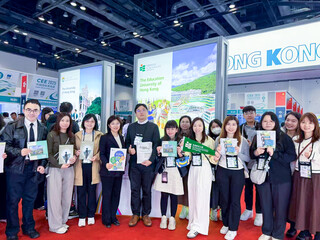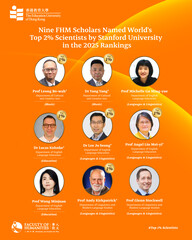Centre for Research on Chinese Language and Education (CRCLE) Shares its Commitment to Bridging Tradition and Innovation
- 17 Sep, 2024
- Feature Stories
- Faculty of Humanities
The Faculty of Humanities (FHM) has established four research centres to enhance expertise in language studies, linguistics, literature, history, cultural studies, music, and visual arts, with ongoing interdisciplinary development in digital humanities and comparative culture of care. In this article, we spotlight one of the research centres, the Centre for Research on Chinese Language and Education (CRCLE).
CRCLE specialises in scientific research in three key domains: Chinese Language Studies (CLS), Chinese Language Education (CLE), and Teaching Chinese as a Second Language (TCSL). Through publications, seminars, conferences, and workshops, CRCLE facilitates research advancement and provides an international platform for collaboration among educators and scholars in the Greater China region to foster synergistic outcomes. The centre also maintains close connection with local schools and stakeholders in Chinese language education.
CRCLE has significantly contributed to academic discourse, publishing around 124 papers recently, with 52 featured in EdUHK’s top-ranked journals. This dedication underscores CRCLE’s essential role in enhancing Chinese language research and education.
Centre for Research on Chinese Language and Education Shares its Commitment to Bridging Tradition and Innovation
In an era where artificial intelligence (AI) and digital technologies are reshaping the landscape of research and education, CRCLE stands at the forefront of innovation in Chinese Language and Education research, all while maintaining a deep respect for language traditions.The FHM Research Bulletin conducted a comprehensive interview with its leaders, Director Dr Liang Yuan and Associate Directors Dr Ding Hongdi and Dr Liao Xian. They shed light on the centre’s amalgamation of cutting-edge technology, humanistic care, diverse expertise, and innovative research methodologies as well as its exciting opportunities and future plans.
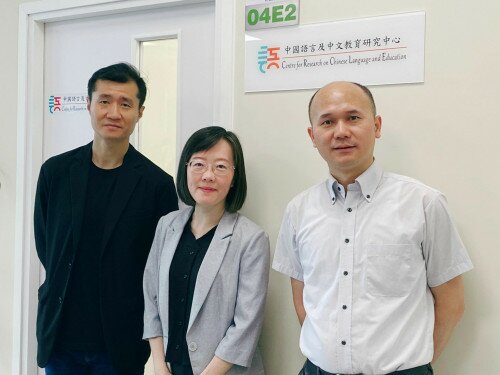
Leaders of CRCLE, Dr Ding Hongdi, Dr Liang Yuan and Dr Liao Xian (from left to right):
Research Foci and Strengths: Combining Expertise in Interdisciplinary and Inter-departmental Research
The centre’s research portfolio spans three key domains. Each area represents a distinct yet interconnected facet of the centre's comprehensive approach to Chinese language research and education.
In CLS, the team conducts research on classical Chinese, modern Chinese, and China's minority languages, with a focus on linguistic research as well as its implications for human history. Notable projects in this area include “Assessing the impact of Sanskrit on the Chinese language” by Prof Zhu Qingzhi (GRF 844710) and “Colexification of dragon and thunder: A feature of Proto-Sino-Tibetan and the origin of dragon” by Dr Ding Hongdi (GRF 18606624).
The CLE team mainly collaborates with local educational authorities to enhance Chinese language teaching in primary and secondary schools. Their significant research achievements include the development of the AI-based application ‘Fun to Chinese Poetry” in a recent CRAC project “An AI-enhanced Way to Learn Chinese Culture: Starting from Classical Chinese Poetry” (03ABQ, PIs: Prof Zhu Qingzhi, Dr Liang Yuan; Dr Liao Xian; Prof Lee Chi Kin John; Prof Leung Pui Wan Pamela) and the creation of the “Corpus of Chinese Written Language in Hong Kong” by Dr Liang Yuan and Prof Zhu Qingzhi.
For TCSL, the research focuses on the distinctive characteristics of diverse learners whose mother tongue is not Chinese and how they acquire Chinese through learning in various settings. They benefit from an extensive network of regional collaborations and partners across different disciplines. Notable studies in this area include “Study on Transition of Chinese Language Learning and Teaching of Non-Chinese Speaking Children from Kindergarten Education to Primary Education” by Dr Liang Yuan (SCOLARR2269) and “Uncovering Relationship between Strategy Use and Chinese Character Writing Performance among L2 Learners in Local and Foreign Contexts” by Dr Liang Yuan in collaboration with Prof Nguyen Hoang Anh of Vietnam National University (GRF 18601721).
Diverse Capabilities: Research Strengths of Centre Members
One of the key strengths of the centre is the diverse capabilities of its members. Dr Liang explains: "Most members of CRCLE are from the Department of Chinese Language Studies, with some also coming from other departments or faculties. Leveraging their diverse research capabilities, the members collaborate within the centre to conduct high-quality academic research on Chinese languages, literature and culture. Furthermore, they translate their research findings to improve professional Chinese language teaching practices for learners of both Chinese as a first (L1) and a second language (L2)." This synergy between theory and practice is further enhanced by the centre's streamlined procedures for external engagement, facilitating efficient scholar exchanges and academic conference organisation. Its robust research support to PhD students, including access to extensive research resources as well as weekly study meetings where centre members offer guidance on student projects, is particularly noteworthy.
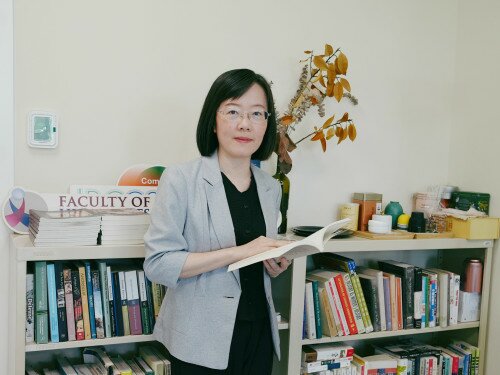
Dr Liang Yuan, Director of CRCLE
Digital Humanities: Fueling Interest and Customising Learning Experience
At the heart of the CRCLE's innovative approach is its embrace of Digital Humanities, exemplified by the development of an AI-based application ‘Fun to Chinese Poetry’ for learning classical Chinese poetry. The application, reportedly the city’s first application to provide comprehensive content for learning Chinese classical poetry, aligns closely with the EDB’s recommended classical poetry texts, featuring engaging multimedia content designed around 50 poems, integrating multiple ways of learning poetry: Reading, Interpretation, Singing, and Playing. Dr Liao elucidates, "This project represents a fusion of AI and language education. With over 180,000 downloads to date, our application marks a significant milestone in this field."
The application's success is underpinned by its capacity to personalise the learning experience. Leveraging AI algorithms, it recommends poems based on individual students' interests and preferences. Furthermore, it incorporates speech recognition technology to provide real-time feedback on pronunciation. Dr Liao enthusiastically demonstrates this feature: "When I use this app and recite in Cantonese, it instantly evaluates my performance and provides a rating."
Behind this user-friendly interface lies a sophisticated database that analyses the intricate characteristics of classical Chinese poetry. He elaborates, "We've conducted an exhaustive analysis of these classical poems, examining aspects such as character frequency, thematic elements, and recurring motifs like flowers, mountains, or pavilions."
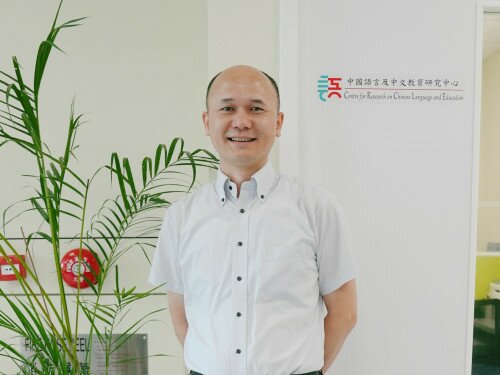
Dr Liao Xian, Associate Director of CRCLE
Humanistic Care: Preserving Linguistic Diversity
While embracing technological innovation, the centre remains deeply committed to humanistic care, which is evident in its projects preserving linguistic and cultural diversity as well as promoting moral and affective education. The centre's director emphasises, "Our work with Non-Chinese Speaking (NCS) and ethnic minority students in Hong Kong, as well as our focus on minority languages, embodies a crucial aspect of humanistic care."
This perspective is echoed by Dr Ding, who emphasises the broader implications of language preservation, especially minority languages. "Many minority languages we examine are endangered languages as the older generation has already stopped speaking these languages to the next generation.” Beyond examining the linguistic structures, he is keen to explore the unique worldviews and historical insights encapsulated in these languages. He posits a profound connection between language preservation and care for the human societies: "By safeguarding local cultures and languages, we're also protecting ecological and historical knowledge embedded within them. The loss of these languages equates to the loss of invaluable environmental wisdom and historical understanding, potentially diminishing our capacity to comprehend human beings and care for our surroundings."
Preservation and Innovation: “Corpus of Chinese Written Language in Hong Kong” Project
Such venerable effort is augmented by the centre’s development of Corpus of Chinese Written Language in Hong Kong, led by Dr Liang. As Dr Ding explains, "We want to probe the features of Hong Kong written language and its divergence from what we call standard written language, which is mainly based on Beijing Mandarin." This project not only serves the academic purposes but also contributes to the understanding and preservation of Hong Kong's unique linguistic heritage.
On education, the centre is breaking new ground with a moral and affective education project. Spearheaded by Dr Liao, the initiative strives to instil children with positive values, including empathy and respecting for others, through language learning.
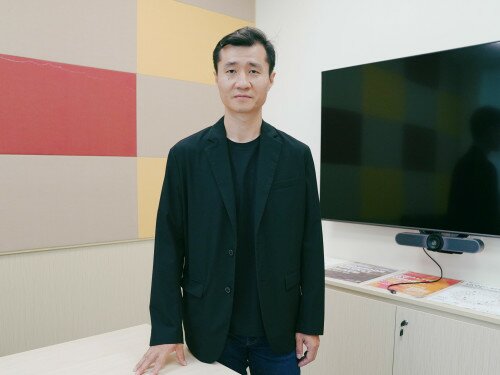
Dr Ding Hongdi, Associate Director of CRCLE
The AI Revolution: Challenges and Opportunities
The rapid advancement of AI technology presents CRCLE with both its most significant challenge and its most exciting opportunity. The centre approaches this technological revolution with a keen awareness of its ethical implications. Dr Liang articulates this perspective: "The ethical considerations surrounding AI are at the forefront of public concern. Our approach to integrating this technology into our research is therefore crucial." To address these concerns, CRCLE is aligning its research with two strategic foci proposed by the Faculty of Humanities: Digital Humanities (DH) and Comparative Cultures of Care (CCC). This dual focus enables the centre to harness AI's potential while maintaining a strong emphasis on cultural understanding and ethical considerations.
Embracing Change: AI in Educational Research
Far from viewing AI solely as a challenge, CRCLE's researchers recognise its transformative potential. Dr Ding emphasises AI's capacity to revolutionise humanities research: "AI technology can significantly enhance research efficiency, enabling us to undertake previously impractical or time-consuming projects." In the realm of Chinese education, the interaction between AI and learners opens up a wealth of unexplored research opportunities. "Consider the challenges of reading and writing. Students often find writing daunting and lack motivation. The extent to which AI has transformed this writing process remains an understudied area in Chinese language research," Dr Liao elaborates.
Triumphant Achievements: Research, Publications, and Collaborations
CRCLE's unrelenting efforts have yielded impressive results. During the 2023-2024 round of exercise, the centre achieved outstanding success in securing research funding, with seven of its academic staff receiving grants from the General Research Fund and Early Career Scheme. This success rate significantly surpasses the university average. Equally noteworthy is the centre's publication record: approximately 124 papers were published between 2019 and 2022, with 52 featured in EdUHK’s top-ranked journals.
Beyond its internal achievements, the centre boasts an extensive network of regional collaborations. "Over the past few years, we've forged partnerships with five institutions through signed MOUs, a number I believe to be unmatched within our Faculty,” Dr Liang states with pride. These partnerships span the region, strategically selected to align with the centre's research directions: Peking University and Beijing Language and Culture University in mainland China for linguistics and for Chinese as an International Language respectively, Vietnam National University in Hanoi for Belt and Road initiatives, and Centre for Chinese Language and Culture in Singapore for language education.
These partnerships facilitate a rich exchange of ideas and resources, including mutual visits, joint seminars, co-supervision of PhD students, collaborative research projects, and academic conferences. They not only enhance the centre's research capabilities but also solidify its position as a leading hub for Chinese language and education research in the Asia-Pacific region.
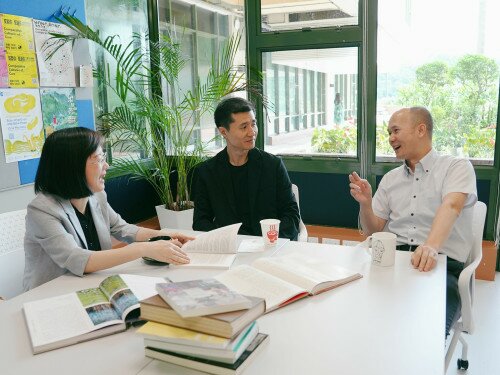
Having an enjoyable afternoon meeting
Future Directions: Embracing Language Contact and Global Collaborations
As CRCLE charts its course for the future, it is set to broaden its research horizons in several exciting directions. Dr Liang anticipates an increased emphasis on language contact studies, with a particular focus on China's ethnic minorities. Dr Liang poses intriguing questions: "When the Bai people learn Chinese, what linguistic changes occur? How might these changes forecast the evolution of modern urban languages, such as those in the Greater Bay Area?" Dr Ding underscores that the intersection of language contact studies, archaeolinguistics, and digital humanities will be a cornerstone of the centre's future research agenda.
This exploration of linguistic diversity and evolution dovetails with CRCLE's expanding global outreach. The centre is strengthening its collaborations with institutions in the Greater Bay Area, focusing on values and CCC, while also engaging with partners along the Belt and Road initiative to study Chinese as an International Language. Capitalising on the global surge in Chinese language learning, CRCLE is examining the learning standards and teaching materials employed by institutions in Belt and Road countries—areas that have received little scholarly attention to date.
Ending
With its interdisciplinary research approach, strong research teams, foci on DH and CCC and practical applications, and unwavering commitment to preserving linguistic legacies, the centre, under Dr Liang's leadership, will continue to make significant contributions to Chinese languages and language education locally, regionally and internationally.
Interviewer: Andy Ng, Kinki Mak and Eric Lam
Author: Eric Lam




